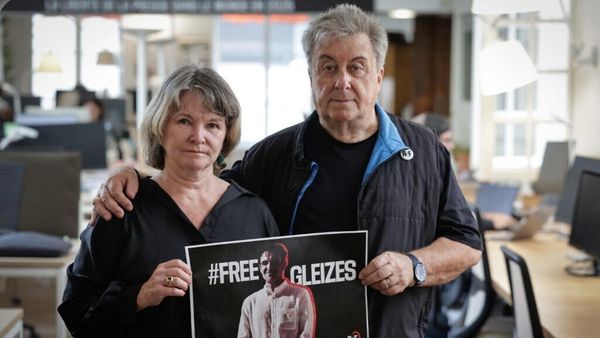Just as Israel seemed on the brink of losing some of its most durable diplomatic support, the killing of two Israeli diplomats in Washington DC could have the effect of calling that shift into question, or at least putting it on hold.
Both Donald Trump and Benjamin Netanyahu blamed the attack on antisemitism, with the Israeli prime minister adding that it was a consequence of “wild incitement” – a comment he later extended specifically to include the recent condemnation of Israel’s conduct in Gaza from the UK, Canada and France.
The shooting of Sarah Lynn Milgrim and Yaron Lischinsky as they left a reception appeared to be politically inspired, with the gunman caught on camera shouting “Free Palestine” as he was apprehended. Initial reports suggested that he had acted alone, but the action and the timing are bound to resonate far beyond the US capital.
The first immediate effect could be to blunt the effect of a joint statement issued only days before, in which Keir Starmer, Mark Carney and Emmanuel Macron had appealed to Israel to stop its military operations in Gaza forthwith and end an almost three-month-long blockade on humanitarian aid. Threatening “concrete actions” if Israel continued an “egregious” expansion of military operations in Gaza, the statement described the level of suffering in Gaza as “intolerable”, and said the “denial of essential humanitarian assistance to the civilian population” risked breaching international humanitarian law.
The statement, which followed a démarche from the head of UN humanitarian relief, Tom Fletcher, about the danger of starvation in Gaza, was the first real evidence that Israel’s conduct in Gaza was losing it some of its last remaining international support. Needled, Netanyahu accused the three signatories of handing Hamas a “huge prize” in the war. Whether or not as a direct effect of this condemnation, the first serious amounts of food aid for almost three months have now started arriving in Gaza.
With Israeli representatives abroad now so clearly at risk, it will be harder for the UK and others to follow up the condemnation contained in their statement, or demonstrate what they might mean by “concrete action”. Netanyahu, Israel and Jewish communities the world over now have fresh and lethal evidence illustrating the extent to which they not only feel but genuinely may be at risk.
And while some will insist that there is a difference between official representatives of the state of Israel, as diplomats are, and members of the Jewish diaspora – many of whom openly dissent from the Netanyahu government – the killings in Washington will inevitably intensify fears of ordinary Jews for their safety, and who is to blame them? Nor is the line between protests against the actions of the state of Israel and ingrained antisemitism always as simple to draw as it might seem.
The killings in Washington are likely to have further immediate effects. One will be increased attention to the security of individuals and institutions associated with Israel or Jewish communities around the world – although how effective such efforts might be in the face of lone assassins and pervasively hostile public opinion must be questioned. Combined with the start of new aid flows to Gaza, another could be the muffling of some international criticism of Israel. After the killings, Netanyahu accused Starmer and other world leaders of “being on the wrong side” of justice, humanity and history.
A third might be a rallying around the flag, if not Netanyahu’s government. It could also cement continued US support.
Unless some new evidence emerges to suggest either that the Washington gunman did not act alone or that the shootings were part of a more organised operation to target Israeli interests abroad, reverberations in the Middle East will probably remain limited. Even if Netanyahu were to embark on additional reprisals against Hamas, it is hard to see how much more he could destroy – which makes for a stark contrast with the attempted assassination, say, of Israel’s ambassador, Shlomo Argov, in 1982.
Argov was shot and paralysed when leaving a diplomatic reception at the Dorchester Hotel in London. The attack was blamed on the Palestinian Abu Nidal group, and Israel’s then prime minister, Menachem Begin, used the attack as a pretext for an all-out invasion of Lebanon. The result was a war that lasted almost three years.
The contrast with 2025 is instructive. Israel’s position in the Middle East now is more dominant and less contested than it was then. Hamas is, or was, a regional operator: nothing like the PLO and its offshoots, which became bywords for international terrorism. There was an organisation, and its protectors, for Israel to take on.
Netanyahu and his government may be tempted to lash out in response to the assassination of their diplomat, but one gunman’s lone protest – if that is what it was – makes an effective reply difficult. At once an isolated incident in a foreign country and a manifestation of a more widely-held public sentiment, this is an atrocity whose recurrence will be exceptionally hard to prevent.
Criticising Netanyahu is not antisemitic – this Jewish rebellion shows why
Editorial: The West has finally spoken up on Gaza – but it must not stop there
I never thought I’d join the Cyril Ramaphosa fan club until I saw him take on Trump
The Golden Dome will go down as Trump’s most explosive folly
I’ve spent decades inside prisons – here’s how I’ll fix them for good







